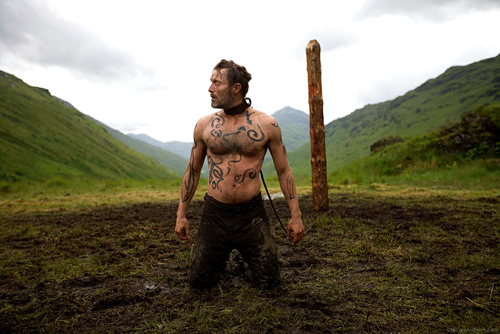What would Odin do? Seriously. What would the Norse god of war do if he ran into a tribe of early Christian evangelists, crucifix banners aflutter and a mound of nude women cringing nearby? It depends on how they treated him, really.
What would Odin do?

What would Odin do? Seriously. What would the Norse god of war do if he ran into a tribe of early Christian evangelists, crucifix banners aflutter and a mound of nude women cringing nearby? It depends on how they treated him, really.
This seems to be the encounter at the heart of Nicolas Winding Refn’s 2009 film Valhalla Rising.
I write “seems to be” because nothing in this film definitively “is” or “is not.” Rather, Valhalla Rising is like a dream vision, an assemblage of mind-bruising violence, dismally rainy landscapes and the barest of character outlines, tenuously strung together by the vaguest of plots.
Only one character even has a name, given to him by a small boy whose tribe he’s massacred in his bid for freedom from slavery. The boy, under pressure from Norse Christian warriors to name the mute pagan, calls him “One Eye.”
Although the film never makes the connection explicit, “One Eye” is a common name for Odin since he shares our protagonist’s (the word applies here in only the loosest sense) physical defect.
In Norse mythology, Odin often walks among mortals, testing their hospitality. Refn’s One Eye (Mads Mikkelsen) finds acceptance—“welcome” would be too warm a word—among these Christians who invite him along in their crusade to reclaim the holy land.
Things don’t go as planned, and they end up elsewhere, maybe the New World, maybe Hell as one of the would-be crusaders calls it.
They all blame One Eye for their misfortune, but they can’t get near him. Anyone who tries is effortlessly killed by the silent brute. Their leader, a pompous fool who carries his sword by the blade to display the crucifix formed by the hilt, begins to unravel. He declares a New Jerusalem. You can imagine how that works out.
At its broadest, the film is about encounters, both personal and historical. The Christian encounter with Paganism. The Norse encounter with the New World. This man’s encounter with these other men.
Yet it doesn’t aim for or seem to claim any sort of historical authenticity. Refn isn’t trying to suggest that this was Leif Erickson’s voyage to Newfoundland. It aims instead to capture a feeling, an impression. Many scenes, especially those in the voyage’s apparently ceaseless fog, bear more than a passing resemblance to a Monet landscape.
The widescreen shots of the Norse (actually Scottish) landscape could be described as beautiful if they weren’t so unrelentingly drab and damp. A soaking rain that makes our climate seem friendly drenches anything and everything. No one seems to have any shelter; they stand out in the open and take it.
The New World, if indeed that’s what it is, is lusher, warmer and drier but somehow still infused with menace. The colors are washed, the sky never clear, but the sun is still too bright.
Their voyage up-river in the New World with natives hiding in the brush definitely nods to Apocalypse Now! There is the same sense of peril, of unpredictability, of everything coming apart at the seams while psyches unravel. And then, to clinch the analogy, they all take some hallucinogenic drugs.
Refn freely admits to borrowing from other works, subscribing to the idea that no work is truly original but is all additive. Yet this film is like nothing you’ve ever seen. It’s certainly not like any Viking film you’ve ever seen.
Where is the heroism, the glory, the charismatic manliness? Certainly there’s an attempt at glory, but it fails horrendously. It never even seems like such an attempt would work. If it did, it would just be a senseless massacre.
The men planning the adventure approach a sort of heroism in their bearing, but they just come off as exactly what they are: A bunch of guys sitting around saying, “Let’s go conquer Jerusalem!” It’s not clear that they even know where Jerusalem is.
It’s gritty hyper-reality, the sort of reality that only masterful artifice can convey, that drives this film. It makes the initial bloodletting so impactive, the whole premise soul-smotheringly depressing. It makes a mockery of religion and casts the warrior’s Christianity as a deficient, diseased performance. The leader is a charlatan. The slave-holding Pagans come off better only by virtue of their being killed off early in the film.
One Eye himself retains a sort of nobility through his silence and his relationship with the child, a relationship that consists of the child following him around and speaking for him. Sure, he’s a bloodthirsty killer, but it seems a role that’s thrust upon him; his role as a slave was as a sport fighter. He only kills when he’s attacked, and his attackers always have murder in mind. He stands above it all even as he’s mired in the same morass as the rest.
But his nobility, if it can be called that, isn’t something to be celebrated. Rather, like his life, it’s something to be endured.
Valhalla Rising (2009)
Friday, June 1, 7 and 9:30 p.m.
Saturday, June 2, 7 and 9:30 p.m.
Sunday, June 3, 3 p.m.
Free for PSU students; $2 all other students and seniors; $3 general





